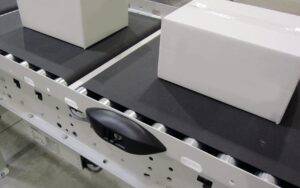As peak season approaches, logistics professionals encounter a unique set of challenges: managing increased volumes, meeting tighter deadlines, and avoiding costly downtimes, all while upholding sustainability commitments. The pressure can be immense, particularly when infrastructure is stretched to its limits. However, with a strategic approach, thriving during this critical period without compromising sustainability is entirely achievable.
The balancing act: efficiency and sustainability
Peak season often presents a delicate balancing act between speed and environmental responsibility. For many logistics facilities, heightened demand necessitates ramped-up operations, leading to increased energy consumption and resource strain.
Continuous warehouse operations escalate wear on equipment, raise maintenance costs, and amplify electricity use for conveyor systems. Many professionals may find themselves asking: How is it possible to maintain efficiency without sacrificing sustainability?
3 key areas to enhance sustainable peak season performance
Reducing downtime with smart equipment choices
Unplanned downtime is the adversary of peak season success. Equipment breakdowns or excessive maintenance disrupt operations, causing delays and escalating costs. A sustainable solution starts with durable, low-maintenance equipment that can minimize interruptions. For example, Ammeral Beltech Ziplink belts are engineered to reduce maintenance needs and can be installed quickly, even under high-pressure conditions. This allows warehouses to continue operating efficiently with minimal interruptions, enhancing productivity and reducing resource waste, all of which aligns with sustainability objectives.
belts are engineered to reduce maintenance needs and can be installed quickly, even under high-pressure conditions. This allows warehouses to continue operating efficiently with minimal interruptions, enhancing productivity and reducing resource waste, all of which aligns with sustainability objectives.
Minimising energy usage with high-efficiency solutions

Energy consumption surges during peak season, especially in high-speed logistics environments. Many warehouses struggle to meet demands without incurring substantial energy bills and increasing their carbon footprint. High-performance conveyor solutions like Ammeral Beltech RAPPLON® high-performance flat belts and heavy-duty roller drives are designed to address this challenge by delivering maximum performance with minimal energy use. These belts, with their wear-resistant polyurethane cover and flexibility, help support accumulation and ensure low energy consumption, even in challenging conditions such as wide temperature variations and heavy loads. Their efficient splicing process also contributes to reliability and reduced downtime, making them an ideal choice when energy efficiency is critical.
Streamlining resources for maximum output
Peak season is an opportunity to reassess resource utilization. Are the materials durable enough to withstand intense demand? Are processes optimized to enhance performance while reducing waste? By minimizing maintenance needs and ensuring easy replacement of key components, like Ziplink and RAPPLON® belts, companies can significantly reduce material waste, lowering both costs and their environmental impact. These logistics solutions are designed to handle heavy use while maintaining optimal performance, supporting a more sustainable approach to peak season demands.
and RAPPLON® belts, companies can significantly reduce material waste, lowering both costs and their environmental impact. These logistics solutions are designed to handle heavy use while maintaining optimal performance, supporting a more sustainable approach to peak season demands.
Looking beyond the season: Preparing for long-term sustainability
For logistics professionals, peak season may be the most challenging time of year. By investing in energy-efficient, low-maintenance systems like Ziplink and RAPPLON® belts, companies can prepare for future demands while simultaneously reducing their overall carbon footprint, ensuring sustainability goals are met year-round.
and RAPPLON® belts, companies can prepare for future demands while simultaneously reducing their overall carbon footprint, ensuring sustainability goals are met year-round.
Read Similar…
The post 3 Essential Strategies to Face Peak Season in a Sustainable Way appeared first on Logistics Business.


